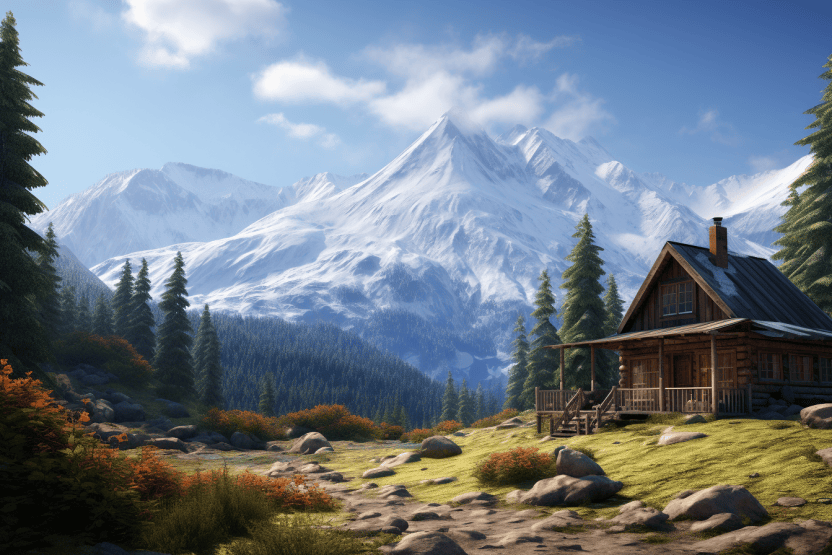Best Country to Live Off Grid
As an avid traveler and off-grid enthusiast, I’ve considered several countries to find the ideal location for living off the grid. Living off-grid can be the ideal lifestyle, providing freedom from the hustle and bustle of city life and a chance to create a sustainable and self-sufficient existence. In my search for the perfect off-grid haven, I’ve come across several countries that offer a welcoming environment for those seeking a self-reliant lifestyle.
Climate, accessibility to resources, and a supportive community are some factors to consider when searching for the best country for off-grid living. While some places may have a friendly and inviting climate, they might lack the necessary resources for an off-grid lifestyle or the community to support it. On the other hand, some countries might have abundant natural resources and a thriving off-grid community, but face challenging weather conditions. Keeping these factors in mind, I have found some countries that seem to offer the perfect balance.
During my research, I’ve come across some countries that stand out as top contenders for off-grid living. These countries offer a favorable climate, rich natural resources, and a community that supports off-grid living. While it may ultimately come down to personal preference and individual needs, these countries have proven to be some of the best choices for creating a sustainable and self-sufficient off-grid lifestyle.
Best Places to Live Off-Grid
North America
In the United States, some top options for off-grid living include Wyoming and Alaska, both offering ample space and relatively low costs. Wyoming is one of the cheapest places to live off-grid, and it has many counties without building codes, providing more freedom. Alaska is a perfect option for those who love wilderness and adventure. If you’re looking for a more tropical option, Puerto Rico offers beautiful scenery and warm weather all year round.
In Canada, British Columbia offers fantastic off-grid options. Freedom Cove is a great example of an off-grid community located near Tofino, British Columbia.
Central and South America
Central and South America have their fair share of off-grid paradises. In Costa Rica, there’s the Finca Bellavista Treehouse Community, which is a sustainable treetop living experience within the rainforest. Panama’s Azuero Sunset Coast is another great option for those who want to experience a vibrant cultural scene and beautiful beaches.
Islands and Remote Regions
Island living can offer a unique off-grid experience. Australia’s Lord Howe Island is a great choice for those who want to live in a UNESCO World Heritage site with limited development and strict environmental policies. Fernando de Noronha, a beautiful Brazilian island, also allows for an off-grid lifestyle and is well known for its biodiversity and pristine beaches.
Easter Island, located in the southeastern Pacific Ocean, offers a rich cultural experience steeped in history and is perfect for those seeking solitude. Macquarie Island, a UNESCO World Heritage Site located between Australia and Antarctica, is another great place for off-grid living, although it might be suitable only for the most adventurous due to its extreme weather conditions.
If you’re willing to venture even further, the remote island of Tristan da Cunha, located in the South Atlantic Ocean between South America and Africa, is considered the most isolated inhabited island in the world, offering a unique off-grid experience like no other.
Key Factors to Consider
Cost and Availability of Land
In my search for the best country to live off-grid, I found that the cost and availability of land are essential factors to consider. Affordable land is crucial for those who want to settle in a location that allows them to maximize their investments while still enjoying a sustainable lifestyle. Some regions offer more availability and lower land prices, making them a more attractive choice for off-grid living.
Water Supply and Quality
Securing a reliable and clean water source is fundamental when choosing a country to live off-grid. Access to water sources like rivers, lakes, and streams is invaluable, as it allows me to minimize the reliance on external water supply systems. Quality is another important factor as poor-quality water can pose health risks and require costly filtration systems.
Natural Disaster Risks
When considering a location for off-grid living, it’s essential to evaluate the area for potential natural disaster risks. Hurricanes, forest fires, earthquakes, and floods can not only damage property but also disrupt the off-grid lifestyle. Choosing a location with a low probability of natural disasters ensures a safer and more stable environment.
Soil and Climate Conditions
For a self-sufficient lifestyle, fertile soil and suitable climate conditions are vital. A location with fertile soil allows me to grow my food, reducing dependency on external sources and enhancing sustainability. Moreover, the climate should be moderate, with enough precipitation and sun to maintain a productive garden or small-scale farm.
Population Density and Zoning Laws
In my experience, lower population density areas allow for more privacy and freedom to live off-grid without disturbance from neighbors or authorities. It is crucial to research local zoning laws to ensure that the chosen area allows for off-grid living and self-sufficiency practices, as some countries have strict regulations.
Renewable Energy Availability
Lastly, the availability of renewable energy sources such as solar, wind, and hydroelectric power is paramount when choosing a place to live off-grid. Harnessing these renewable energy sources allows me to be independent of the public power grid, enhancing my sustainability and reducing energy costs. The region’s climate plays a crucial role in determining the effectiveness and efficiency of these energy sources.
Homestead Requirements and Building Codes
Rural and Urban Differences in Codes
In my research, I’ve found that rural areas generally have more lenient building codes and zoning laws compared to urban areas. This makes it easier for those looking to live off-grid in rural locations. For example, minimum lot size requirements for agriculture-zoned land in some places are often 20 or 35 acres, which provides ample space for a homestead and farming activities^1^.
On the other hand, urban building codes may have stricter regulations, such as limits on the types of renewable energy sources that can be installed, or requirements to be connected to the electrical grid. This can make it challenging for those who want to live off-grid in more urban settings.
Navigating Zoning Laws and Restrictions
One of the key factors to consider when choosing a location for an off-grid homestead is the local zoning laws and restrictions. In many cases, these laws dictate who can live on a property, what types of structures can be built, and how land can be used^1^.
To navigate these laws, I would recommend getting familiar with the specific regulations in the area where you plan to build your off-grid home. In some cases, it might be worth working with a local attorney or expert who specializes in land use and zoning law to ensure you are in compliance.
Balancing Off-Grid Living with Modern Conveniences
For many people, the appeal of living off-grid is the freedom from reliance on public utilities, like electricity, water, and sewer systems. However, when setting up an off-grid home, it is important to balance this freedom with modern conveniences to ensure a comfortable and sustainable lifestyle.
One consideration is incorporating renewable energy sources, like solar or wind power, to generate electricity for your home^2^. Another consideration is setting up rainwater catchment systems or drilling a well for water supply, while dealing with water waste through composting toilets or septic systems.
Ultimately, finding the right balance between off-grid living and modern conveniences will vary depending on personal preferences and the specific requirements of your chosen location.
Renewable Energy Options
As someone who wants to live off-grid, it’s important for me to explore the renewable energy options available for generating electricity. These options can help reduce dependence on fossil fuels and contribute to a sustainable lifestyle. In this section, I will discuss the following renewable energy options: Solar Power, Wind Power, Hydropower, and Geothermal Options.
Solar Power
I find solar power to be one of the most popular and accessible options for off-grid living. By installing solar panels, I can convert sunlight into electricity for my home. To maximize solar energy production, it’s crucial to consider factors such as location, panel positioning, and energy storage. Battery systems can be used to store excess solar energy for use during nighttime or cloudy days.
The efficiency of solar power systems has been improving over the years, making it a more affordable and viable option for off-grid living. Moreover, solar power is clean and requires minimal maintenance, making it an environmentally friendly choice.
Wind Power
Wind power is another renewable energy source that can be harnessed off-grid. By installing wind turbines on my property, I can generate electricity from the movement of air. Wind power systems are available in various sizes to suit different requirements.
However, the efficiency of wind power depends on factors such as the location’s wind speed and consistency. It’s essential to conduct research and assess the site’s wind potential before investing in a wind power system. Combining wind power with solar power can help ensure a more consistent energy supply.
Hydropower
If my off-grid property is near a water source, such as a river or stream, hydropower might be a viable option to generate electricity. In this method, water flow is used to turn a turbine, which converts kinetic energy into electrical energy. The capacity of a hydropower system depends on the water source’s flow rate and drop height, also known as the “head.”
It’s important to note that hydropower systems can have environmental impacts, such as affecting aquatic life and water quality. Therefore, it’s crucial to implement responsible and sustainable practices when harnessing hydropower.
Geothermal Options
Geothermal energy is another option I can consider for off-grid living. This method involves tapping into the Earth’s natural heat sources. Geothermal systems use heat pumps to extract heat from underground and transfer it for space heating or cooling.
While geothermal energy is clean, reliable, and can provide consistent energy, it’s relatively expensive to install and requires a suitable location with access to geothermal resources. Nonetheless, geothermal energy can be an excellent long-term investment for those living off-grid, especially when combined with other renewable energy options.
Food and Water Sustainability
Methods for Rainwater Collection and Purification
Rainwater harvesting is an essential part of off-grid living, especially when local water availability is scarce. I have found that there are several methods to collect rainwater, such as using gutters and downspouts on rooftops, barrels and cisterns for storage, and tarps and catchment systems for ground collection. To ensure the water is safe to consume, I use water purification methods like boiling, ultraviolet (UV) purification, and filtration systems.
Growing and Preserving Your Own Food
To become self-reliant and sustainable, I believe in growing my own food. This can be done through various techniques like gardening, permaculture, and hydroponics. It is important to choose crops wisely, considering factors such as the local climate and soil conditions. Opting for plants with a long growing season, like tomatoes, squash, and peppers, provides ample harvests that I then preserve through canning, drying, or freezing to enjoy later.
Additionally, I ensure to practice regenerative agriculture techniques, like crop rotation, organic amendments, and companion planting, to maintain soil health and increase yield.
Rearing Livestock for Off-Grid Homesteads
Incorporating farm animals into off-grid sustenance not only provides nutritious food sources, such as eggs, dairy, and meat but also contributes to a closed-loop ecosystem where waste can be transformed into valuable resources like compost and biogas. I recommend rearing chickens for eggs, goats, or cows for milk, and pigs for meat. These animals can be easily managed on a homestead and, when cared for properly, integrate seamlessly into the sustainable off-grid lifestyle.
Off-Grid Communities
International Off-Grid Communities
One of the most notable off-grid communities is the Dancing Rabbit Ecovillage in the United States. This community is dedicated to sustainable living and is a great example of what an off-grid lifestyle can look like.
In Japan, there is the Konohana Family community. This group focuses on organic farming and communal living while maintaining a strong connection to nature.
Another international example is the Lammas Ecovillage in Wales, which has been established as a low-impact, self-sufficient homestead community. People living here practice eco-friendly farming, sustainable construction, and work together to ensure they are living as harmoniously as possible with the environment.
North American Off-Grid Communities
For those seeking off-grid communities in North America, I have come across several options. For example, the Rivers Recreation Area is a community located in Florida. Known for its beautiful landscape and serene natural environment, it is ideal for people who want to live off-grid and enjoy outdoor living.
Canada also hosts the Freedom Cove community, situated on Vancouver Island. It boasts an array of structures such as a two-story home, a dance floor, a lighthouse, four greenhouses, a studio, a half-acre garden, and even an art gallery – all while providing an off-grid experience.
Benefits and Challenges of Joining an Off-Grid Community
Living in an off-grid community comes with numerous benefits. For one, my ecological footprint is significantly reduced as I would rely on renewable energy sources and sustainable practices. This lifestyle promotes self-sufficiency and greater independence from societal constraints, often enabling a more relaxed and harmonious living experience.
However, joining an off-grid community is not without its challenges. I must adapt to the sometimes limited resources, as well as learn new skills such as gardening, animal husbandry, and sustainable construction techniques. These communities may also be more remote, which could mean less accessibility to certain amenities like healthcare, education, and professional opportunities.
Despite these challenges, living off the grid can be a rewarding adventure for those who are well-prepared and committed to a more sustainable way of life.
Preparation and Planning
Assessing Personal Goals and Values Before Moving Off-Grid
Before I decide to move off-grid, it’s important for me to assess my personal goals and values. Living off-grid can be a hard work and truly rewarding experience, but it’s not for everyone. I must consider whether this alternative lifestyle aligns with my long-term objectives and beliefs. By evaluating my priorities, I can determine if living off-grid is a good choice for me and my family. Some questions I should ask myself might include:
- Am I ready for the physical and mental challenges of off-grid living?
- Do I value self-reliance and sustainability over modern conveniences?
- Can I adapt to a slower-paced lifestyle in a rural setting?
Reflecting on these questions will help me understand if moving off-grid aligns with my personal values and goals.
Creating a Plan and Timeline for Transitioning Off-Grid
Once I’ve determined that off-grid living aligns with my values, the next step is to create a plan and timeline for the transition. Finding the perfect place to live off-grid is key, so researching different locations and their off-grid opportunities is crucial. I’ll need to consider factors such as:
- Climate: What type of weather suits my preferences and off-grid plans?
- Legality: Is living off-grid allowed in my desired location?
- Community: Are there other off-grid homesteaders in the area to provide support and a sense of community?
With these factors in mind, I can start looking for land that matches my needs and preferences. It’s also a good idea to visit potential off-grid locations, allowing me to see firsthand if a particular area fits my vision.
Next, I need to develop a timeline for transition, considering the following steps:
- Skill Development: What skills do I need to acquire or improve upon for a successful off-grid life?
- Finance Management: How will I establish a budget and secure funds for the move and ongoing off-grid expenses?
- Property Preparation: What steps do I need to take to prepare my new off-grid home for a sustainable lifestyle?
By setting a clear plan and timeline for transitioning to off-grid living, I can better prepare myself and my family for the exciting journey ahead.
Frequently Asked Questions
What are the top locations for off-grid living?
I believe some of the best countries for off-grid living include New Zealand, Canada, and Costa Rica. New Zealand is known for its stunning landscapes and strong self-sufficiency culture, while Canada offers vast wilderness areas and an abundance of natural resources. Costa Rica provides a tropical climate, fertile land, and affordable cost of living. Each of these countries has different advantages, so it’s important to consider your personal preferences and priorities when choosing a location. You can find more information on the best countries for off-grid living in this article.
Which countries offer the most affordable off-grid lifestyle?
Countries with a low cost of living, such as Nicaragua, Ecuador, and Thailand, are often considered most affordable for off-grid living. The availability of affordable land and housing, inexpensive local food, and relatively low utility expenses contribute to a more economical off-grid lifestyle in these countries. Keep in mind that individual experiences may vary depending on lifestyle choices, skills, and resources.
Where can I find the optimal climate for off-grid living?
The best climate for off-grid living depends on your personal preferences. If you prefer a mild, temperate climate, countries like New Zealand, the United Kingdom, and parts of the United States might be suitable. For a tropical and warm environment, places like Costa Rica, the Caribbean, and parts of Southeast Asia could be ideal. Check the climate information for each country and consider your needs for agriculture, heating, and water sources when selecting the perfect location.
Are there any legal restrictions to living off-grid in certain areas?
Yes, some countries and regions have legal restrictions on living off-grid. It’s crucial to research local laws and regulations regarding off-grid living before making any commitments. This might include building codes, land usage restrictions, and access to resources such as water and electricity. Make sure you understand the legal implications of your off-grid lifestyle and work towards compliance in the country or area you choose.
What are the best places to live off-grid in the United States?
There are several great places in the United States for off-grid living, including states with abundant natural resources, affordable land, and favorable policies, such as Idaho, Montana, and Tennessee. Rural areas and small towns tend to offer more opportunities for off-grid living than densely populated urban areas due to zoning regulations and access to resources. Do thorough research on the local regulations and climate to find the perfect spot for your off-grid homestead.
How can I find off-grid communities or land to join?
One way to find off-grid communities or land is through online forums and social media groups focused on off-grid living. These platforms are great for connecting with like-minded people, sharing experiences, and finding potential off-grid opportunities. You can also search for off-grid real estate listings, visit eco-villages, and attend workshops and events related to off-grid living. Networking and building relationships with people in the off-grid community can be incredibly helpful when seeking opportunities to join an existing off-grid community or find suitable land for your off-grid dream.








